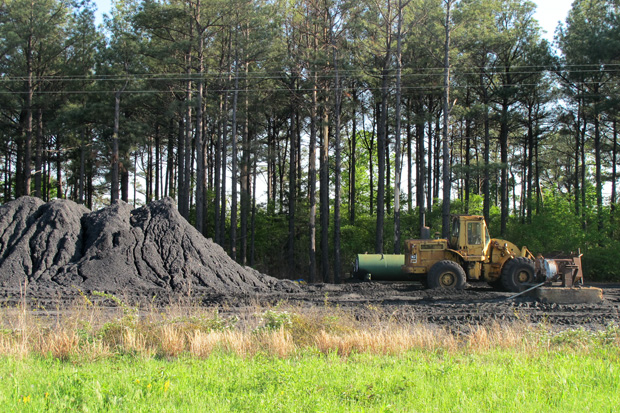Study: Anti-EPA States Like Oklahoma Would Benefit Most from New Carbon Rules
-
Logan Layden

Logan Layden / StateImpact Oklahoma
A pile of coal sits along the railroad tracks just east of Red Oak, Okla.
Oklahoma has been battling the U.S. Environmental Protection Agency over new environmental regulations since Gov. Mary Fallin came into office in 2010, and Attorney General Scott Pruitt is vowing to fight the latest proposed rule that would cut carbon emissions by 30 percent nationally.
But a new study from Strategic and International Studies and the Rhodium Group shows the state might be shooting itself in the foot by fighting what could end up being an economic boom.
From The New York Times‘ Coral Davenport:
The study took into account the economic costs imposed by the regulation and concluded that it would raise electricity rates by up to 10 percent in some parts of the country and eventually freeze coal production. But even taking those costs into account, Arkansas, Louisiana, Oklahoma and Texas together would experience an annual net economic benefit of up to about $16 billion, according to the study.
“The irony is that some of the states that have been the loudest in opposing E.P.A. climate regulations have the most to gain in terms of actual economic interest,” said Trevor Houser, an analyst at the Rhodium Group and a co-author of the study.
Those four states, which the study says would collectively see an up to $16 billion boost, would have to cut the most carbon pollution of any region in the country to comply with the new regulation. But as StateImpact has reported, Oklahoma gets most the coal it uses from other states like Wyoming, so there’s not much of a coal industry here to hurt.
But Oklahoma’s natural gas industry would likely flourish as utility companies search for alternate fuel sources.
But switching from coal to natural gas wouldn’t be cheap for the state’s electric companies, which would have to charge customers more to make up the cost. The New York Times reports that at a Wednesday meeting of the Senate Committee on Environment and Public Works, U.S. Senator Jim Inhofe said Oklahoma may not be a major coal producer, but it does have people who make their livings in coal mines.
Mr. Inhofe, who has called climate change at the hands of humans a hoax, did not question the study’s findings and agreed that, in the short term, his state’s economy was likely to benefit from the E.P.A.’s proposed rule. But he said that the uneven impact of the rule nationally — a lift to natural gas-producing states but a hit to coal-producing states — would also be felt in Oklahoma. For example, he said, there are plans to build a new coal mine north of Poteau, Okla. “It’s a very significant part of a somewhat poor part of the state,” he said, adding that “they would be devastated” if the regulation were enacted.
He asked EPA Administrator Gina McCarthy what would happen if Oklahoma just didn’t submit a plan to cut carbon emissions. In that case, the federal government would step in to enforce a plan of its own, which would doubtlessly lead to a lengthy court battle over the federal government’s authority.
If that sounds familiar, it’s the same process Oklahoma went through over the Regional Haze Rule. The U.S. Supreme Court sided with the EPA in that case. The state has also lost cases over the cross-state air pollution and mercury and air toxics rules.
